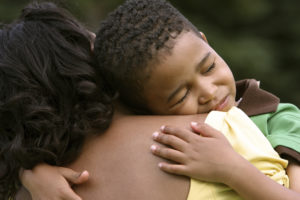
How to Tell Your Younger Kids About Divorce
Utilizing a few techniques when discussing the divorce decision with your children can make this difficult time as easy as possible for them.
- Tell Kids about the Divorce in Advance: Gather the entire family together at a time that is convenient for everyone to inform them of the divorce in advance. Do this in a safe and private, comfortable place that is free from distraction. Telling the kids yourself before the word gets out will allow you to properly explain matters and prevent potentially harmful misinformation.
- Formulate a “Mutual Story” of Divorce: A mutual and consistent story from parents about the divorce will be easier for kids to deal with emotionally. To accomplish this, it is better that parents inform their children about the divorce at the same time while everyone is together as a family. This way, children will avoid becoming less confused than if they should end up hearing two different stories from either parent, muti-layered matters and situations are often accompanied by multiple truths. It is also recommended to avoid assigning blame.
- Speak With Children in a Way They Can Best Understand: Younger, less developed children will benefit most from being spoken to in simple and easy to understand terms, and at a slightly slower pace than is usual. Let kids know that the divorce is about the marriage and that it is not their fault as the child.
How to Tell Your Teenagers About Divorce
Speaking to teenagers about divorce could be more, or less difficult, depending on the maturity level of the child.
- Understand the Problems Facing a Teenager: It may be easier to explain a divorce to a teenager, but this is an age group that is already dealing with plenty of problems and stress of their own due to their physical, social, and intellectual development.
- Teenagers Are Usually More Directly Involved: Teenagers are more cognizant of the particulars of a divorce and are more likely to be consulted about various matters, such as which home they choose to make their primary residence. This could create more stress for a teenager than there would be for a younger child.
- Avoid Explicit Details: It may seem tempting to familiarize your teenager with some of the particulars of the divorce and discuss matters as if they were your friend. Although teenagers may appear to be quite mature and knowledgeable about the world, having heard about parents who cheat on their spouses, for example, it is not always the best idea to share such delicate information.
- Keep Some Information Private: Professional psychotherapists warn against sharing certain explicit details about a marriage and advise keeping some things as your own private business. Too much information can also be emotionally burdensome for a teenager.
- Be Aware of the Way the Divorce Changes Things for the Teenager: Teenagers are developing their own identities and just coming into themselves for the first time. They are also finding their own way in social environments, and helping them to deal with any pressure they may feel about the divorce is important at this stage.
Don’t Face Your Divorce Alone
Let the Law Office of David Pedrazas, Utah’s full-service family law firm, represent you and protect your interests as well as those that directly affect the future of your children. Contact us today, if you are in need of legal advice or representation, for a Legal Case Review. The Law Office of David Pedrazas can represent you in your divorce, child support, child custody, and many other family cases. Call us at 801-263-7078 today.
